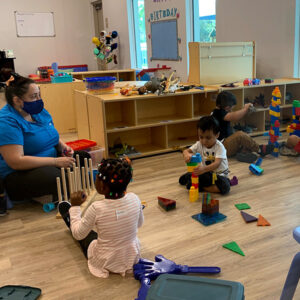Expanding a Nonprofit’s Cradle to College Programs
View more stories from our 2020 Annual Report
The Guadalupe Center began as a soup kitchen in a church to feed migrant workers in Immokalee, Florida. Volunteers quickly realized that the children who came through did not speak English and were often not ready for school. Forty years later, the work of the organization has shifted and grown significantly.
 The early days of Guadalupe Center solidified its focus on education as an agent of change for children in the community. “We provide education for children from six weeks through college so that they can break the cycle of poverty through education,” said Dawn Montecalvo, the organization’s president.
The early days of Guadalupe Center solidified its focus on education as an agent of change for children in the community. “We provide education for children from six weeks through college so that they can break the cycle of poverty through education,” said Dawn Montecalvo, the organization’s president.
Immokalee, meaning “my home” in Seminole, is a town with an area just of 36 square miles. Forty percent of the community are migrant workers. English is a second language in most homes, with Spanish or Creole being the primary language for most community members. Immokalee is also a young community, with 32% of the population under 18 and a median age of 25.
“We provide education for children from six weeks through college so that they can break the cycle of poverty through education.”
— DAWN MONTECALVO, PRESIDENT, GUADALUPE CENTER
With 43.4% of Immokalee’s residents living in poverty and only 39.3% of adults having high school diplomas, Guadalupe Center seeks to unlock opportunities for the community’s children through three programs that span from infancy through college: Early Childhood Education (ECE) to help kids become kindergarten-ready; After-school Tutoring to provide support to students in K-2 to read on grade-level; and Tutor Corps, a college preparatory program which gives high school students opportunities to work, earn scholarships, and receive mentorship during their college careers.
The impact Guadalupe Center has on Immokalee’s youth is profound. Serving 1,400 students each year, 95% of its ECE participants met or exceeded readiness standards for kindergarten. One hundred percent of students in After-school Tutoring made significant gains in math and reading in 2019. While recording these successes, waiting lists for their programs grew.
Expanding Access
Montecalvo and her team knew they were making a difference. However, they wrestled to figure out how to reach even more of Immokalee’s children.
The Guadalupe Center turned to the Reinvestment Fund for help. Reinvestment Fund has a long track record of supporting high-quality education programs and offered the right expertise to help Guadalupe Center navigate an expansion to serve more children. Financing through Reinvestment Fund, together with Partners for the Common Good (PCG) provided $15.8 million in New Markets Tax Credit financing, to help Guadalupe Center to achieve their goal of helping more families.
“We’re adding two campuses in a two-phase project,” explained Montecalvo. “The Monaghan Campus opened in August, and is an early childhood education building with six classrooms for 64 children. It’s a very fun place. The kids are thriving.”
The second phase of the project is the van Otterloo Family Campus for Learning, a nine-acre campus featuring two buildings that will open in December 2021. One building will include twelve classrooms to accommodate 154 children under the age of five. Brynne & Bob Coletti Hall will house the After-school and Tutor Corps programs.
The two new campuses will grow Guadalupe Center’s Early Childhood Education Program from 307 children to 525 students. “The new centers allow us to hit a critical need,” Montecalvo explained. “We will be adding 218 children to the program by the end of the year. That’s 218 more children that are going to have an academic foundation. They won’t be behind in school. These kids will graduate high school. They will go to college.”
The project also expands Guadalupe Center’s work with high school and college students. Tutor Corps will engage 125 students in grades 9 through 12 annually, providing them with hourly wages for tutoring in the After-school program, scholarship funds, and mentorship. It also provides for engaging with 150 college students in the college portion of the Tutor Corps program, providing them with needed support and resources to see them through to graduation.
Guadalupe Center’s expansion will increase the organization’s capacity by 28%, allowing it to reach 1,893 youth from infancy through college.

Guadalupe Center’s expansion will increase the organization’s capacity by 28%, allowing it to reach 1,893 youth from infancy through college.
Supporting Educational Success
Guadalupe Center’s work and relationships don’t end when its students leave Immokalee. The organization knows that a college education is critical to students’ future success. Without support, the numbers for first-generation college students are bleak. “If you do look at the numbers of first-generation college students of color who graduate college, it’s about 17 to 19% nationwide,” Montecalvo shared. “Our graduation rate is 93%.”
The organization does this by forming relationships with small liberal arts colleges around the country suggested by donors looking for the bright, talented youth who comprise the Tutor Corps. Partner schools provide financial support through scholarships, and emotional support through the help of a staff member assigned to be a close on-campus resource. “We’re very proud that we just don’t give our students a scholarship to go to college,” said Montecalvo. “We get them to a college that fits them and helps them succeed.”
 One such partnership for the Tutor Corps is with Arcadia University, where Islande Victorin has just completed her sophomore year. Originally from Haiti, she moved to Immokalee ten years ago and began working with Guadalupe Center her sophomore year of high school. Victorin has found the continued support through the organization invaluable. “I will talk to them as long as I can!” she laughed. “We speak regularly about academics, personal life, finances–whatever comes up,” Victorin said about Jorge Perez, her college coordinator. “I’m able to get lots of wisdom and help from him.”
One such partnership for the Tutor Corps is with Arcadia University, where Islande Victorin has just completed her sophomore year. Originally from Haiti, she moved to Immokalee ten years ago and began working with Guadalupe Center her sophomore year of high school. Victorin has found the continued support through the organization invaluable. “I will talk to them as long as I can!” she laughed. “We speak regularly about academics, personal life, finances–whatever comes up,” Victorin said about Jorge Perez, her college coordinator. “I’m able to get lots of wisdom and help from him.”
Though COVID-19 pandemic has altered the college experience for Victorin and her peers, she’s making the most of the experience. She finds Glenside, PA to be a quiet place and warm community, much like Immokalee. Majoring in Healthcare Administration and minoring in Global Public Health, Victorin plans to take advantage of Arcadia’s study abroad program in London.
Remaining connected with Guadalupe Center is important to Victorin not just for her own experience, but for other youth at home. “Knowing that students I have tutored will have this opportunity in the future means a lot to me,” she said. Victorin also knows that she’s setting an example for her two younger brothers, who are also involved with the program.
All told, the funding to expand Guadalupe Center’s programs will increase the organization’s capacity by 28%, allowing it to reach 1,893 youth from infancy through college. Though Reinvestment Fund staff were only able to learn about Guadalupe Center’s work through Zoom due to the pandemic, the power of and passion for the work came across clearly. “They got what we do, and they understood it. Everybody really talked about the mission and was supportive of it,” Montecalvo recalled.
Montecalvo and her team hope to welcome members from Reinvestment Fund to the opening of the van Otterloo campus at the end of the year to share in the celebration of what they have collectively built. “I’m really, really proud that we’ll be able to address a critical need in the community,” she said.
Guadalupe Center’s programming from cradle to college produces educational success for youth in Immokalee and beyond, building relationships with and between students. By providing access to strong educational programs that bring out the inherent ability of each child, futures filled with high school success, college graduation and beyond are a reality for the youth of Immokalee.